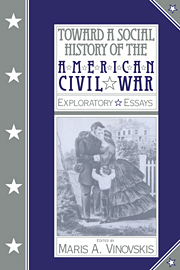Book contents
- Frontmatter
- Contents
- Introduction by Marts A. Vinovskis
- 1 Have Social Historians Lost the Civil War? Some Preliminary Demographic Speculations
- 2 Community and War: The Civil War Experience of Two New Hampshire Towns
- 3 The Northern Soldier and His Community
- 4 Voluntarism in Wartime: Philadelphia's Great Central Fair
- 5 The Civil War and Municipal Government in Chicago
- 6 Who Joined the Grand Army? Three Case Studies in the Construction of Union Veteranhood, 1866–1900
- 7 “Such Is the Price We Pay”: American Widows and the Civil War Pension System
- Index
4 - Voluntarism in Wartime: Philadelphia's Great Central Fair
Published online by Cambridge University Press: 03 February 2010
- Frontmatter
- Contents
- Introduction by Marts A. Vinovskis
- 1 Have Social Historians Lost the Civil War? Some Preliminary Demographic Speculations
- 2 Community and War: The Civil War Experience of Two New Hampshire Towns
- 3 The Northern Soldier and His Community
- 4 Voluntarism in Wartime: Philadelphia's Great Central Fair
- 5 The Civil War and Municipal Government in Chicago
- 6 Who Joined the Grand Army? Three Case Studies in the Construction of Union Veteranhood, 1866–1900
- 7 “Such Is the Price We Pay”: American Widows and the Civil War Pension System
- Index
Summary
In September 1864 Philadelphian John J. Thompson penned a lengthy description of America's “fearful ordeal” to a cousin overseas. Although there had been “gloomy and discouraging periods,” as the conflict came to a close the iron manufacturer found cause for pride:
The progress of our war has of course worked great changes in military and naval matters – but it has also developed an amount of sympathy, active, earnest and working, with suffering sick & wounded soldiers, such as has no parallel in the history of the world – The amount of volunteer labor on the battle fields, and in the Hospitals, has been extraordinary and the voluntary contributions by our citizens through the Sanitary Commissions amount to many millions of dollars in money & hundreds of tons in merchandize etc!
This enthusiasm for Civil War voluntarism was especially marked in Philadelphia. Soldiers passing through the City of Brotherly Love repeatedly paid tribute to its particularly benevolent citizenry. As one French traveler reported, “Philadelphia has not lost her religious character; she remains equally faithful to her philanthropic traditions.”
Civil War Voluntarism
Thousands of Philadelphians took part in the “peoples' contest” from behind the lines by working at sewing circles, visiting hospitals, staffing refreshment saloons, or raising money for one of the score of local and national soldiers' aid organizations. Philadelphia supported its own array of voluntary groups, but two national organizations – the United States Sanitary Commission (USSC) and the United States Christian Commission (USCC) – dominated the national scene.
- Type
- Chapter
- Information
- Toward a Social History of the American Civil WarExploratory Essays, pp. 93 - 116Publisher: Cambridge University PressPrint publication year: 1990



